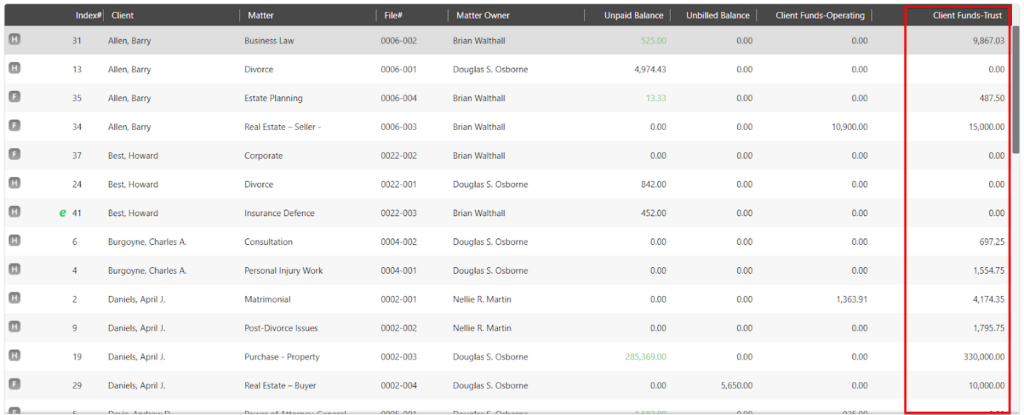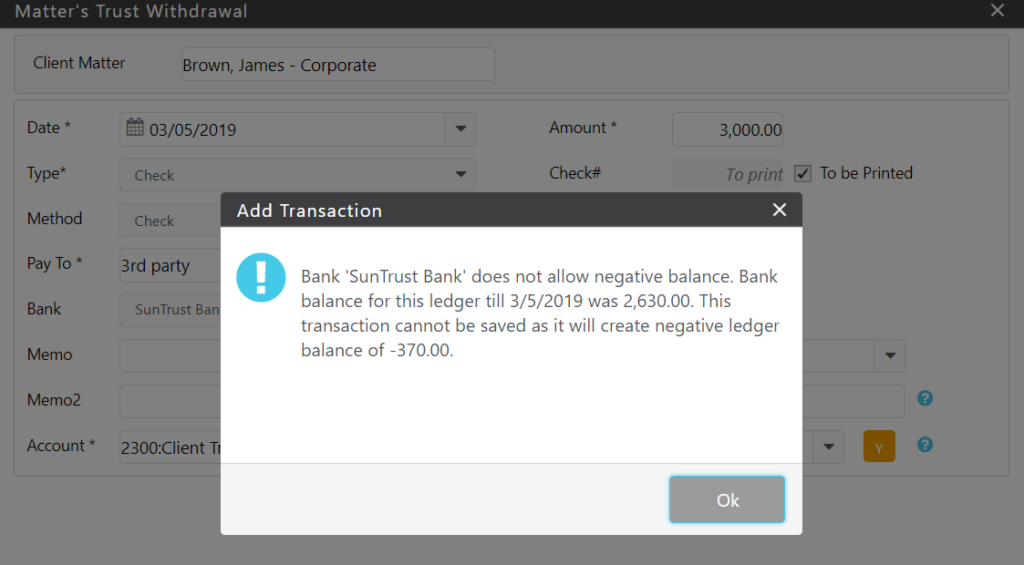Trust accounting is a critical function for law firms, as funds that are not yet earned or disbursed must be handled in compliance with state and federal requirements. Because of this, managing the trust account can seem intimidating. It’s essential that the firm is well aware of the requirements—regardless of who is doing the work—and doing everything possible to abide by them.
Considering trust compliance has a strong focus on what not to do, using generic accounting tools or written/excel ledgers to manage your trust account increases the risk of non-compliance because those systems are very flexible. Utilizing legal-specific accounting tools, like CosmoLex, can greatly reduce and, in some cases, eliminate those risks.
CosmoLex contains the full trust accounting workflow—matter ledgers, trust transactions, checks, reconciliation, and reporting. In order to avoid common mistakes, the system provides the following safeguards:
No Commingling of Funds
Matter-specific ledgers are at the core of trust accounting. In many more flexible systems, where designating a matter is not required, you can end up with a sum of funds not assigned to anyone, resulting in commingling and inaccurate ledger balances. In CosmoLex, you cannot complete a trust transaction without first designating the matter to ensure all funds belong to a specific ledger. You also cannot utilize one matter’s funds for the purpose of another. If, for some reason, funds need to be shifted to another ledger, a matter-to-matter trust funds transfer utility is provided.

No Ledger Overdrafts
We’re all familiar with bank overdrafting, but with trust accounting, you also need to be mindful of individual ledger overdrafts. Each matter has its own ledger balance which must never go negative. Even with recording individual matter ledgers, it is possible to overdraft without proper safeguards in place. In CosmoLex, if you have $3,000 for a matter but try to enter a $4,000 withdrawal, you are prevented. Even though there is enough money in the account, there is not enough for that matter. The system will also let you know how much you would have overdrafted and what funds are needed to complete that withdrawal.

No Duplicate Checks
With trust accounting, your bank ledger must be accurate and reflect what happens in real life. For this reason, every transaction should have a unique reference number. When writing or printing checks, there should only be one of each check number within a particular account. To ensure accuracy, CosmoLex will not allow you to record multiple transactions with the same check number, because in reality, only one exists.
Reconciled Months are Closed
Reconciling is a core function of trust accounting as well, because comparing your books with the bank records brings to light any errors which need to be addressed. Once a reconciliation is complete and signed off on, no further changes should be made, as the books have already been balanced. With more flexible systems, if you go back and make changes to reconciled items, it will throw off your balances and reporting, possibly resulting in other issues like overdrafts. For this reason, CosmoLex closes the books once reconciled, eliminating the risk of others editing prior items and leaving the books unbalanced.
Automated Compliance Reporting
A trust account is only as good as the reporting you are able to provide. We always recommend operating your trust account as if you will be audited tomorrow. Having a packet of compliance reporting at the ready provides some peace of mind should your trust books be questioned. With this, many don’t know where to start. I highly recommend speaking with your local bar and ethics board to know what is asked for upon audit, so that you can proactively ensure those reports are being generated. Within CosmoLex, we provide 10+ trust reports including your trust reconciliation, which are always available (including prior months).



